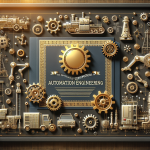In today’s tech-driven world, automation engineers stand at the forefront of transforming manual tasks into efficient, automated processes. They harness the power of technology to solve complex problems, and their day-to-day activities reflect a unique blend of creativity, technical skills, and problem-solving acumen. This article offers an insight into the daily life of an automation engineer.
Morning Routine: Planning and Coordination
The day usually begins with a cup of coffee and a quick review of emails and project management tools. Morning meetings are commonplace, often involving cross-functional teams, including software developers, quality assurance specialists, and project managers. These meetings serve to align on goals, address any blockers, and strategize for efficient project execution.
Automation engineers often use tools like JIRA or Trello to track progress on various projects. They review tasks assigned, prioritize them, and set aside time to tackle the most critical items. A typical morning also includes gathering requirements from stakeholders to decide how to approach a new automation project.
Mid-Morning: Coding and Development
Once the day’s priorities are set, it’s time for hands-on work. Automation engineers spend a significant portion of their day writing code, often in languages like Python, Java, or JavaScript. They develop scripts and programs that will automate repetitive tasks, be it in software testing, infrastructure management, or data processing.
During this phase, engineers also integrate automation tools and frameworks such as Selenium, Jenkins, or Puppet. They need to ensure that the tools are customized to the specific needs of the team, which sometimes involves troubleshooting existing systems. This requires not just coding skills but a solid understanding of the underlying processes to ensure seamless integration.
Lunch Break: Collaborating and Networking
The lunch break provides an excellent opportunity for informal discussions and brainstorming sessions with colleagues. Engineers often swap ideas and share insights on best practices. Collaborative lunches can spark conversations about new tools or methodologies that could enhance workflow and productivity, fostering a culture of continuous improvement.
Afternoon: Testing and Analysis
Post-lunch hours typically focus on testing the automated solutions developed in the morning. This involves running multiple scripts, capturing results, and identifying any discrepancies or errors. Automation engineers analyze performance metrics to assess the efficiency of their solutions.
Testing is a critical stage where attention to detail is paramount. It requires not just technical knowledge but also analytical thinking—evaluating whether the automation performs as intended and if it meets stakeholders’ requirements. If issues arise, engineers iterate on their code, often debugging in real-time.
Late Afternoon: Documentation and Reporting
As the day winds down, documentation becomes crucial. Automation engineers meticulously document their processes, scripts, and findings to create reference materials for themselves and their teams. This documentation can serve as guidance for future projects and facilitators for other team members to understand automated workflows.
Additionally, they might prepare reports that explain the outcomes of their work. These reports are often shared in team meetings or with stakeholders, showcasing the impact of automation initiatives on efficiency, time savings, and overall productivity.
End of the Day: Reflection and Learning
Before wrapping up, many automation engineers take time for self-reflection. They review the day’s accomplishments and challenges, jotting down notes for the next day. Continuous learning is a vital aspect of being an engineer, as technology evolves rapidly. Engineers often utilize platforms like Coursera, Udacity, or even GitHub to stay updated with the latest trends, languages, and tools in automation.
Conclusion
The life of an automation engineer is a dynamic blend of coding, testing, collaboration, and continuous improvement. Each day brings unique challenges and opportunities to innovate, optimize, and automate processes that enhance efficiency in various industries. Through their work, automation engineers not only simplify tasks but also empower organizations to focus on what truly matters—strategic growth and innovation.
This evolving field holds immense potential, marking a pivotal role in the future of work and technology.




